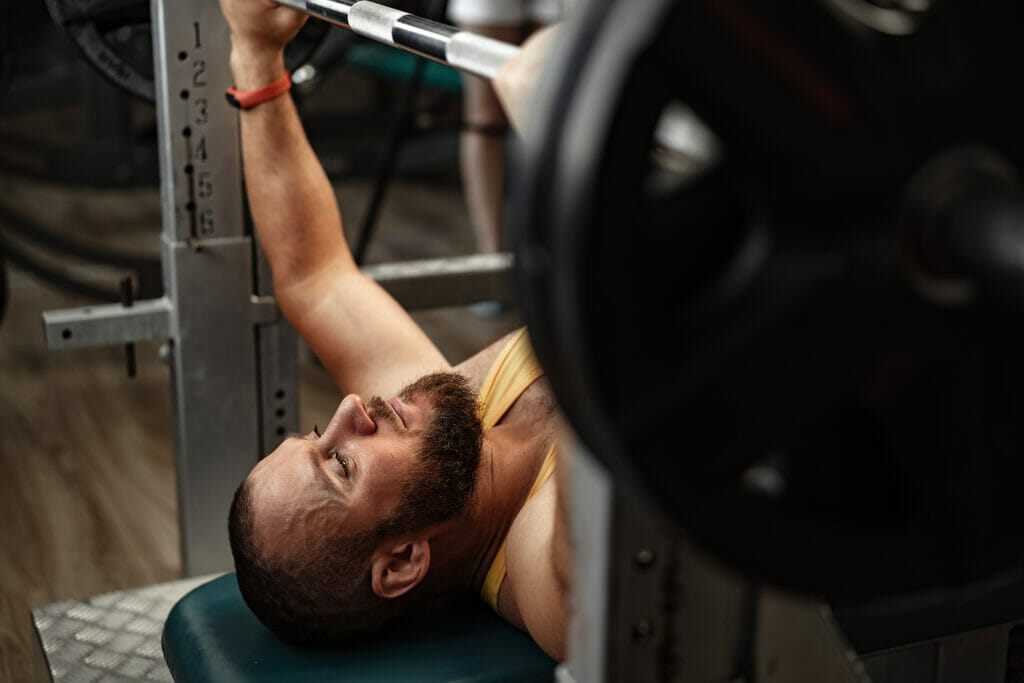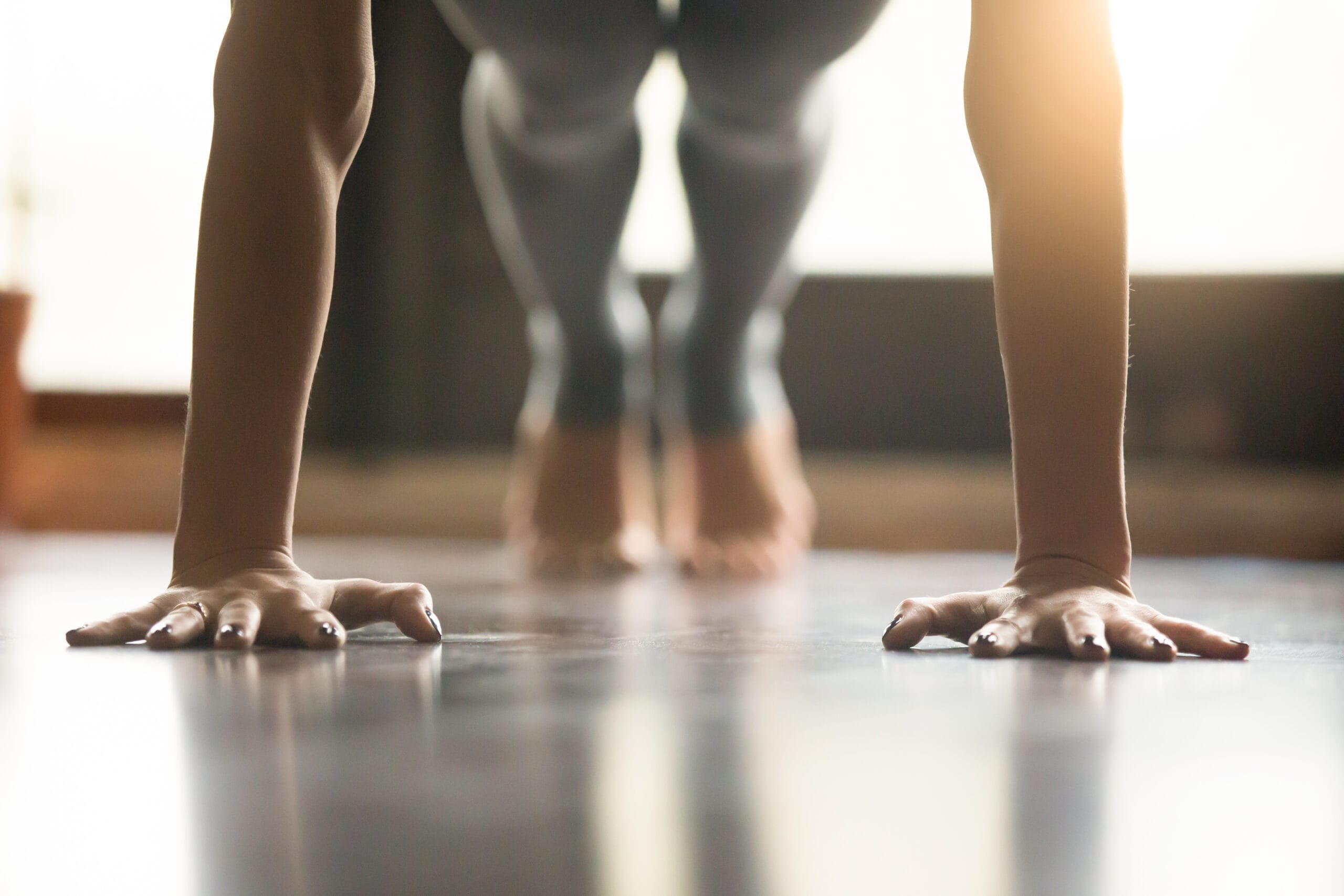
I’m intrigued by powerlifting, not only because of the mind bending weights these individuals can lift, but also because of the discipline and technique necessary to achieve the seemingly impossible.
And let’s be real, who doesn’t enjoy watching YouTube videos of people lifting insane amounts of weight?
Well, I found myself going down a rabbit hole of bench pressing videos on YouTube when I came to a video of this elite lifter doing reps at 800 lbs (yeah, I know, insane).
I was obviously impressed by the feat, but I was also a little confused about what he was wearing.
I don’t think this particular lifter was technically wearing a bench shirt (it looked like he just had a thick resistance band across the front between his elbows), but I’ve watched other videos with these dudes wearing these things designed to help ’em bench more weight.
So, it sparked my curiosity about these specialized garments that are known as bench shirts and I did a little digging.
And of course I felt I might as well share what I found with my readers, so off we go.
What Exactly Is A Bench Shirt?
My brother dabbles in powerlifting and has never participated in any amateur competitions or anything, but the dude has done a 400 lb bench press – something few of us will ever accomplish.
Well, I was talking to him about some of the gnarly videos I had seen on YouTube and we started talking about these bench shirts.
He had never used one, but he said he had randomly just been talking to one of the trainers at his gym about ’em and the benefits they can offer to increasing your bench weight.
Bench shirts come in various styles and designs, but basically they all consist of a really tight garment that’s supposed to assist your bench press.
They’re especially tight in the front where your pecs are (many don’t have a full closing back) and they actually resist the movement of bringing the bar down to your chest.
Apparently, many newbies to using bench shirts can’t even get the bar down to their chest for the first several attempts because it takes time to get used to and to find the right fit.
Speaking of fit, these things are supposed to be really tight when fit correctly.
So tight in fact, that it can take multiple people to help get you in one.
The fabric used in a lot of the elite bench shirts has some contractive qualities to it (like a really thick spandex), so as you bring the bar toward your chest, it’s like compressing a spring.
Meaning that spring is gonna help you as you try to push the bar back up to its starting position.
As I’m writing this, it reminds me of those ab wheels that have the built-in spring to help bring it back to you after you’ve extended out.
As you roll out, the spring compresses and as it springs back it helps you bring the ab wheel back to the starting position.
Honestly, I never really understood this because it makes the exercise easier, thus decreasing possible strength gains from the core move.
I guess I could see it being beneficial for folks who aren’t ready to do a full ab rollout, but it still feels like it’s kinda taking something away from the exercise…
Anyway, in a nutshell – a bench shirt is a really tight, “springy” shirt that you can wear to help push the bar back up from your chest.
Oh and apparently it also helps with stabilizing your shoulders too, which can also give you an advantage when it comes to setting a new PR.
Are Bench Shirts Allowed In Competitions?
Uh, that would be a big no.
There are a bunch of different local, state, national, and world powerlifting organizations (IPF, USAPA, GPC, etc) and I haven’t found any that allow bench press shirts in organized competitions.
Most of these groups have really strict policies about what can and can’t be worn in competitions, with most only allowing single ply shirts or singlets.
Some even crack down on the use of elbow braces, wrist straps, and the amount of ace bandages you can use to support joints.
So, with considering this, it’s unlikely that any large group competition is gonna allow the use of a shirt that helps you lift more weight.
Does That Meaning Using A Bench Shirt Is “Cheating”?
I’m gonna be honest, I’m not a powerlifter (far from it actually), but my take is that it depends on what you’re trying to get out of it.
If you were trying to sneak a bench shirt in to some kind of organized competition, then yes, I would say that would be cheating.
But if you’re simply using one to train on your own and see what kind of weight you can lift with one, then no, I wouldn’t call it cheating.
But I can see why lifting purists may not be a big fan of ’em.
Using a device that helps you lift more weight and then calling that new weight your max bench sounds a little shady.
Especially if you’re boasting around lifters who don’t use bench shirts.
To me, it would be more interesting to see how a bench shirt affects your 1 RM – you know, max out with and without it and see how much it really helps.
Based on the research I did, it looks like most lifters can expect to lift 10-15% more from a low quality shirt and upwards of 20-30% or even 50% more with a high-quality one.
That’s a pretty big difference.
For example, let’s say you bench 200 lb without assistance (or ‘raw’) – that means, best case, you could bench upwards of 300 lb with a high-quality shirt…
Wow.
Hell, even a 20% increase (going from 200 lb to 240 lb) is pretty significant too.
But again, I have to kinda wonder what the point is – do you get the same kind of strength gains by training with a shirt that you’d expect from training without one?
I would have to guess no, but maybe.
I would also wonder if training with a bench shirt helps you make faster improvements when benching without one.
I don’t know the answer to this (if someone reading does, please share with comments below), but the therapist in me would guess ‘possibly’.
If wearing a bench shirt allows you to rack up more weight more quickly, this in itself could possibly help improve overall pec, shoulder, and tricep strength.
But the fact that these shirts help stabilize the shoulder externally might mean that the muscles responsible for this don’t have to work quite as hard, thus negating the benefit of the added weight.
Intriguing.
Final Thoughts
Honestly, I never plan on trying a bench shirt, but I find the idea of them existing to be interesting.
As a more casual weight lifter, I’m more interested in improving/maintaining overall strength and I would see the use of a shirt like this to be kind of counter-intuitive to my goals.
Because I’m not especially worried about the number of plates on the bar, as long as I’m making progress.
But like I said, I’m not a powerlifter.
Anyway, I don’t think I consider using a bench shirt to be cheating exactly, but I definitely think there would need to be an asterisk beside any PR set while wearing them.
I don’t think it would be cool to tell people about a new PR and leave out the part about wearing a bench shirt either.
Everyone has their own thoughts about what’s acceptable when it comes to these lifts and that’s cool.
Hell, some people (like my brother) don’t even think people should be able to arch their back when benching, even though it’s allowed in most organized competitions (most only require the neck, shoulders, hips, and feet to be grounded).
So it all depends on what you’re into.
And I want to make sure everyone realizes I’m not trying to take anything away from the powerlifters using bench shirts because even with one, holding a bar with 800 lb+ on it is a staggering accomplishment.
So, if you want to wear your bench shirt to add a few extra plates to that bar, I say go for it.
But I’d love to hear from the powerlifters out there and how they feel about these garments.
Have you tried one before? Did it really improve your numbers?
More importantly, did it help improve your raw bench press?
Just leave comments below and let’s get the conversation going.


